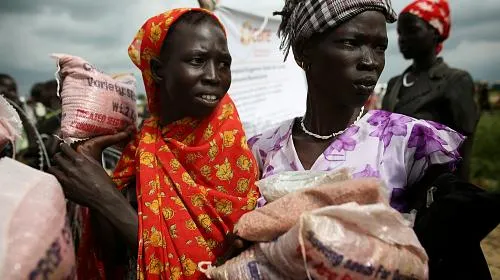JUBA—(August 09 2016)– CARE is deeply concerned about the safety of women and girls displaced by the recent outbreak of fighting in South Sudan. “In the past weeks we heard troubling accounts of women being raped, gang-raped, beaten or robbed, many of them by soldiers outside the areas where civilians are being protected by the UN. These women had to leave these safe areas to search for food and basic supplies. It is horrendous that they had to make a choice between safety and survival”, says Fred McCray, CARE’s Country Director in South Sudan. “Unfortunately, this is a choice many South Sudanese women have to make during this conflict.”
Since the South Sudan conflict started at the end of 2013, rape has been continuously used as a weapon of war by all warring parties. A recent UN Population Fund analysis found one-in-five displaced women in South Sudan had been raped during the ongoing conflict. Although the United Nation reports at least 217 cases of sexual violence and rape in Juba alone since fighting erupted on July 7, many cases go unreported and undocumented.
“Many women are too scared of reprisal attacks and too ashamed given the stigma attached to rape. They often have no access to safe support services, including healthcare or legal assistance,” McCray continues. As CARE found in a study published in 2014, only seven percent of interviewed women who experienced violence reported it to the police.
“While some people displaced from the recent outbreak of violence have begun to return home, the situation is still tense,” says CARE’s Fred McCray. “We need to ensure that women are safe, that they have safe access to healthcare, psychosocial support services and legal assistance. We urgently call for holding the perpetrators of sexual violence and their superiors to account for these terrible crimes.”
In addition to its ongoing humanitarian assistance, CARE is scaling up an emergency response to support people, especially women and girls, affected by the recent violence. “We will work to establish safe and effective referral systems among those organizations providing support to affected women, as well as, counseling for women and girls who experienced sexual violence,” says McCray. “It is crucial, that the performance of the UN Mission in South Sudan (UNMISS) is improved to better protect civilians and facilitate humanitarian assistance.”
In the previous years, CARE worked to reduce and prevent incidents of violence against women with traditional and formal legal systems to provide legal redress and punishment for perpetrators, as well as, providing survivors of abuse with job opportunities to help them rebuild their lives. CARE also provides survivors with information where they can go for legal and medical assistance and trains clinical staff on psychosocial and physical support to survivors.
-End-
Media contact: Holly Frew (Atlanta), hfrew@care.org, +1 770 842 6188
About CARE: Founded in 1945, CARE is a leading humanitarian organization fighting global poverty. CARE has more than six decades of experience helping people prepare for disasters, providing lifesaving assistance when a crisis hits, and helping communities recover after the emergency has passed. CARE places special focus on women and children, who are often disproportionately affected by disasters. To learn more, visit www.care.org.

